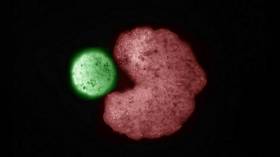Military medics tout new vaccine to end Covid-19 pandemic
A candidate vaccine that uses a novel platform and may be good enough to deal with existing and emerging variants of SARS-CoV-2 viruses, will reportedly be announced soon by researchers at the Walter Reed Army Institute in the US.
The unveiling may come “within weeks,” according to Dr. Kayvon Modjarrad, director of Walter Reed’s infectious diseases branch, who was interviewed by Defense One. According to the military publication, the candidate vaccine may offer a single-shot, wide-scale immunity from diseases caused by human coronaviruses, including from future mutations.
The formula uses a novel Spike Ferritin Nanoparticle (SpFN) platform. Ferritins are natural proteins shaped like globular cages that are normally used by an organism to store iron. Its self-assembly properties have made it an interesting tool for nanofabrication applications.
In the case of vaccination, the protein’s 24 subunits can be fitted with protein spikes similar to those that viruses use to attach to living cells before infecting them. Such nanoparticles may be injected to train the immune system to fight against real viruses. With various kinds of spike proteins included in the same vaccine, it can immunize against a wide range of viruses, past and future, the researchers hope.
Modjarrad’s team says it has good expectations about the efficacy and other properties of their SpFN vaccine-in-waiting, after conducting clinical trials with animals. Their latest publication in Science Translational Medicine details experiments they conducted on rhesus macaques. A separate, Phase 1 human trial has been underway since April.
The challenge with the human trials, Modjarrad told Defense One, was and remains finding people who are still unvaccinated and never caught Covid-19 for the studies to be accurate. He added that his team also wants to evaluate their product “in the real-world setting” with people who were vaccinated or who’ve recovered from the disease.














